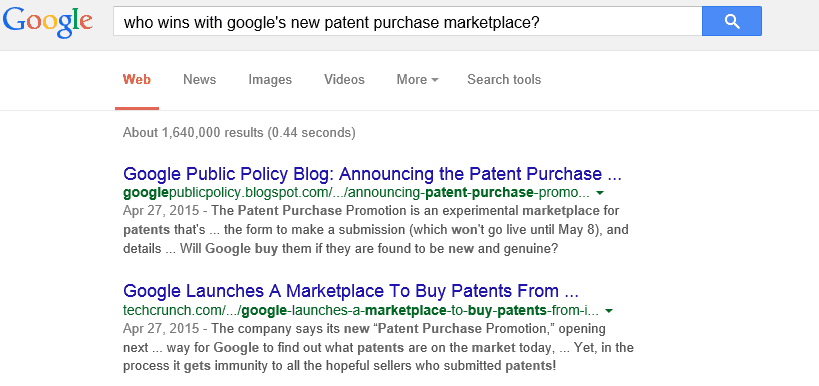Hodgson Russ – Jordan Walbesser – There’s something off about Google’s Patent Purchase Promotion. Purchasing patents is not new. In fact, Google has a long history of buying patents.
What’s new is the idea of a limited-time solicitation. To me, Google’s announcement evokes a stereotypical used-car ad—“Get a great deal on your patent, but you better hurry, because this offer won’t last!” And just as the car dealership continues to sell cars after the “big, blowout sale,” Google will continue to buy patents after the promotion ends.
During Google’s promotion period, sellers get one shot at naming their price for a single U.S. patent. No counter-offer. No negotiations. Although this greatly simplifies that patent purchase process, sellers may not receive top dollar for their patent, because the short length of the program makes it difficult for patent holders to shop around for competitive bids.
Another gripe is Google’s motivation for this promotion. Google tells us that this program will “remove friction from the patent market” and “improve the landscape.” But for whom—the public, startups, or Google? It’s true that the usual patent marketplace can sometimes be challenging. But how does Google’s purchase of hundreds or potentially thousands of patents solve that problem?
There’s some interesting language in the purchase agreement too. For example, the seller receives an irrevocable, nonexclusive, nontransferable, nonassignable, nonsublicensable license to their former patent. This allows the seller to continue practicing their invention after the sale.
However, a seller must turn over, if available, all available “conception and reduction to practice materials.” If the seller had a patent on an article of manufacture that the seller built, does Google get the product and the tooling for the product?
Even though the seller gets a license to practice the patent? If so, for sellers that practice the patent, Google’s purchase agreement could have serious operational consequences.
And why should inventors and entrepreneurs sell patents to Google? After all, there are plenty of other companies—including non-practicing entities—that might be interested in a good patent. According to Google, the Patent Purchase Promotion “might yield better, more immediate results for patent owners versus partnering with nonpracticing entities.” Maybe that’s true, but it’s tough to avoid skepticism when Google benefits exclusively from the sale.
Let’s give Google some credit. Although Google controls a large patent portfolio, the company pledged that it would not engage in “troll-like” behavior. Google has lived up to its promise and has only used its patents defensively, countersuing for patent infringement only when sued first.
The Patent Purchase Promotion is a great experiment, and might lead to some good outcomes and interesting data. Google instructs sellers that they may publicly discuss “generalized information about the Patent Purchase Promotion (e.g., number of total submissions, breakdowns by technology area, etc.) Perhaps the public might be able to use some of this data for future patent purchases as well as a baseline for calculating license fees or damages.
In the end, the program seems like a good way for Google to assess the patent market, including finding patents that might cause trouble in the future. In addition, Google can do this without substantial transactional costs. As far as investments go, this is a smart move for Google.
That said, I would rather that Google invest the time and money in startup companies holding good patents rather than the patents themselves. There are plenty of would-be entrepreneurs with the skills and knowledge for a successful startup, just waiting for help to move forward. Transferring their patents to Google instead, where they might just languish, doesn’t help entrepreneurs. It really only helps Google.
[table id=10 /]





